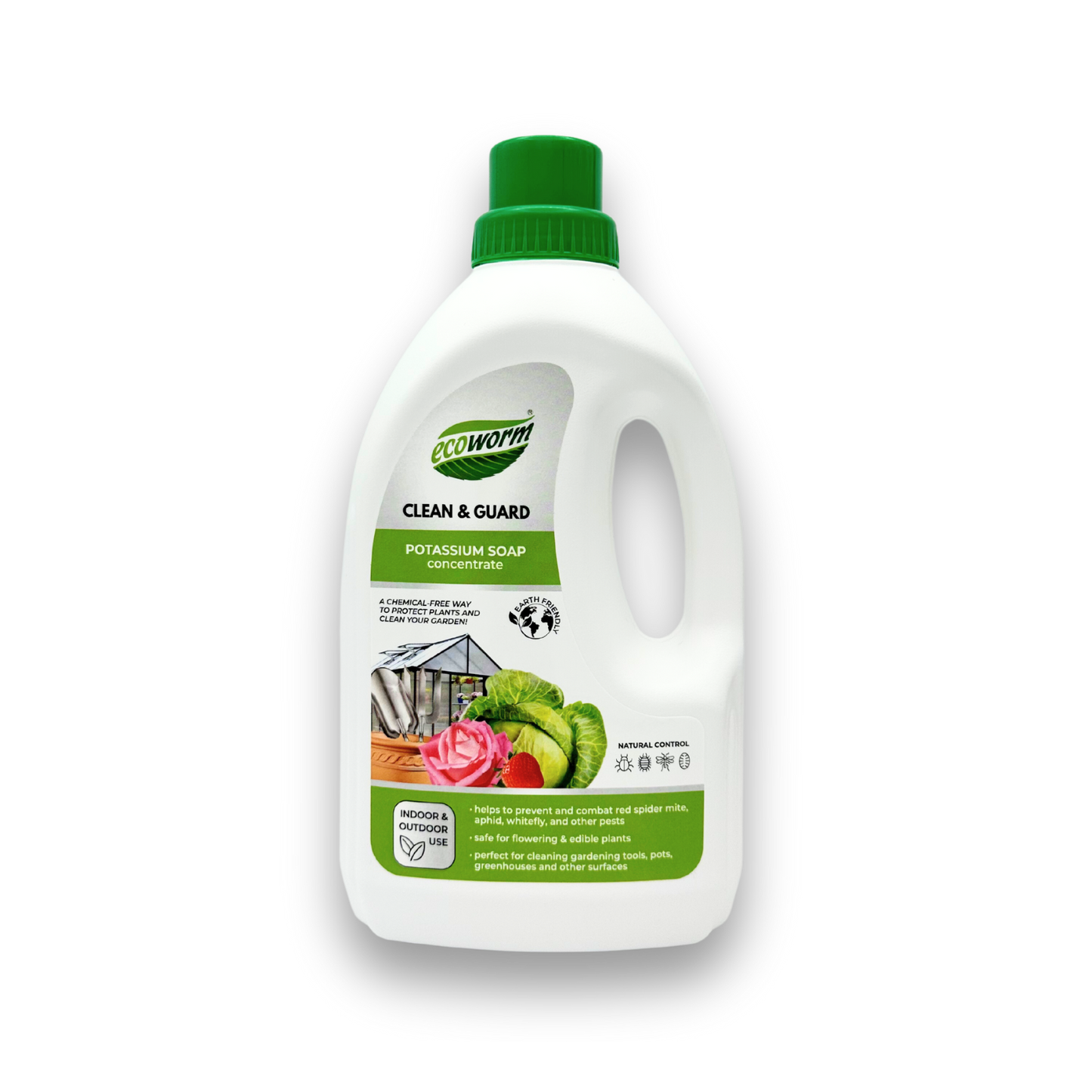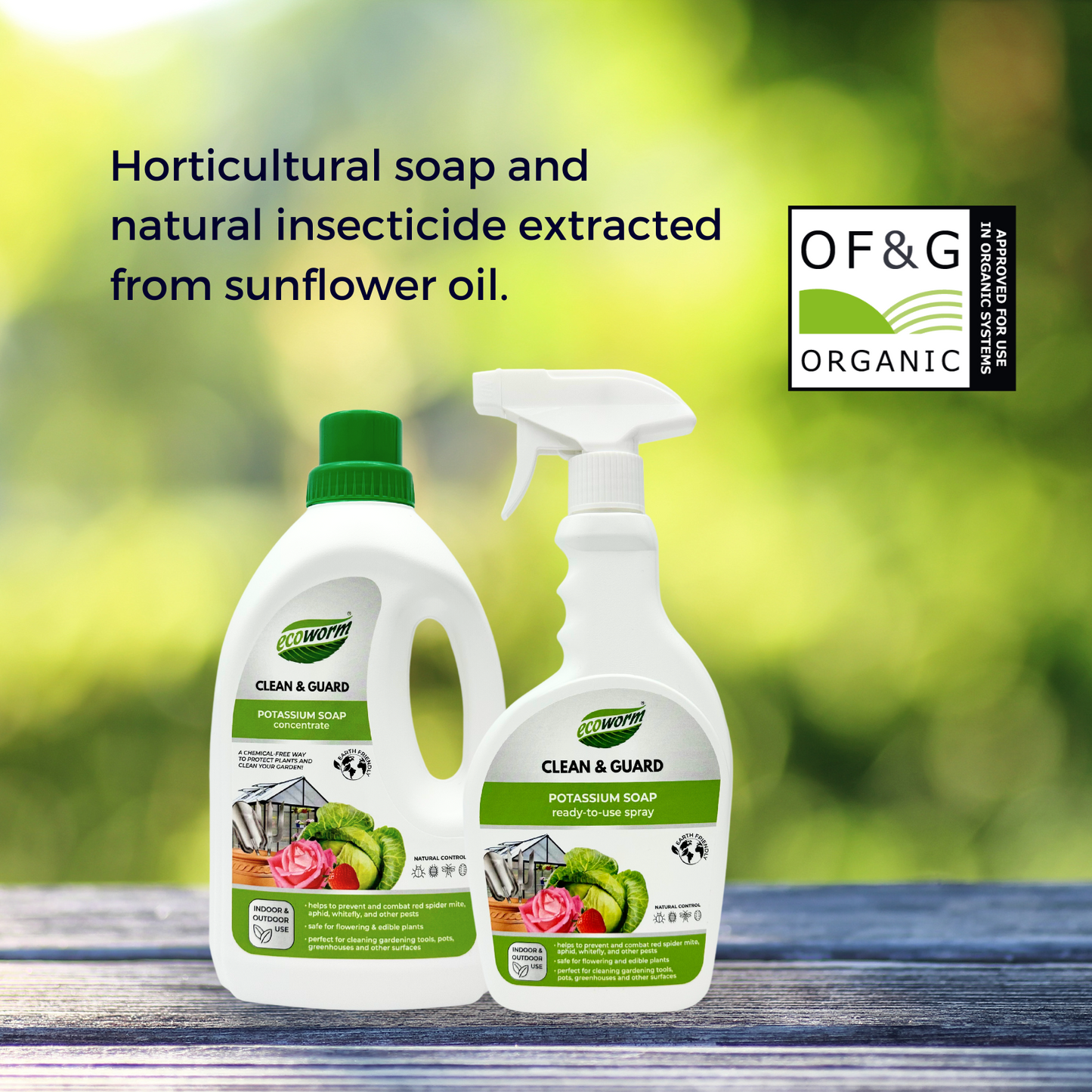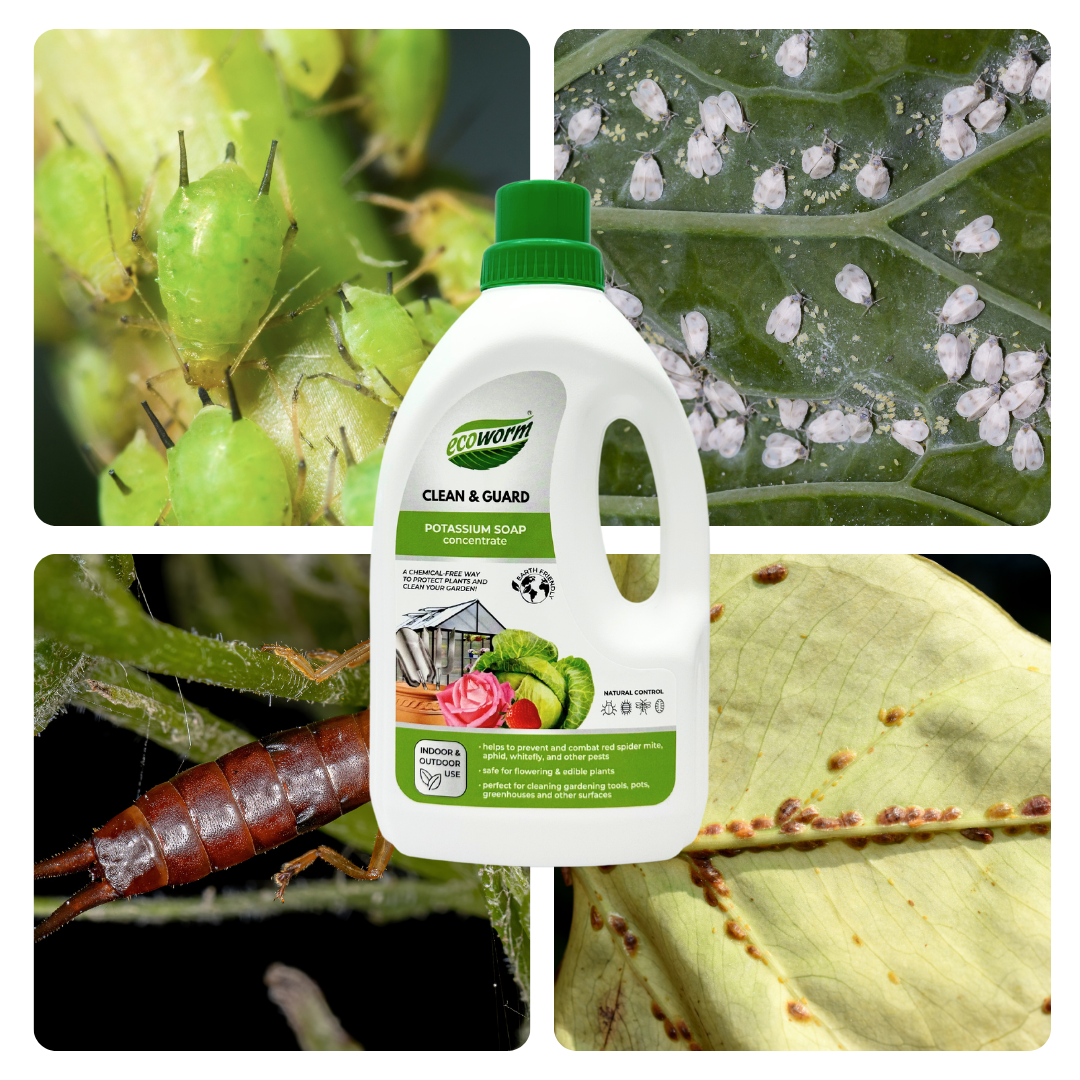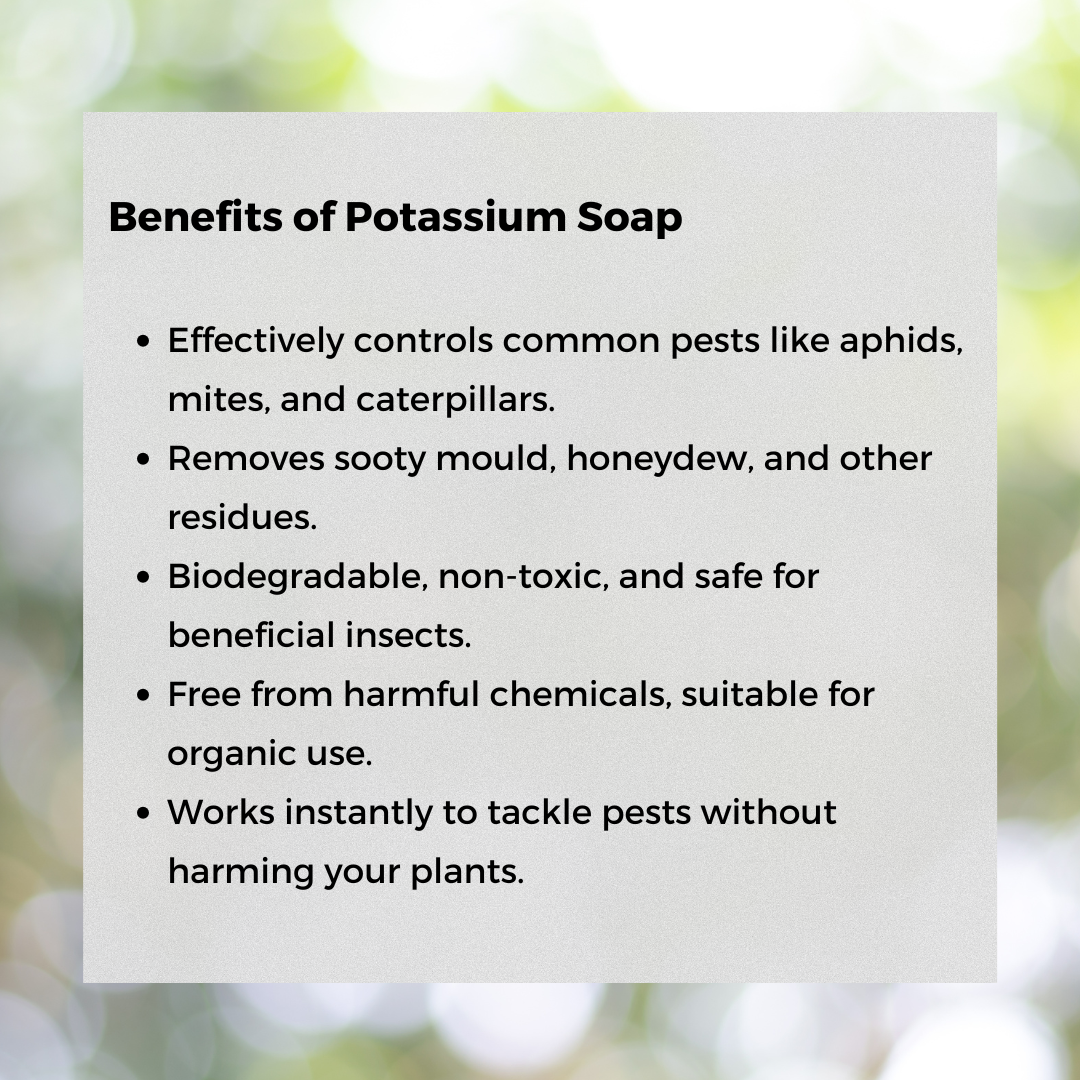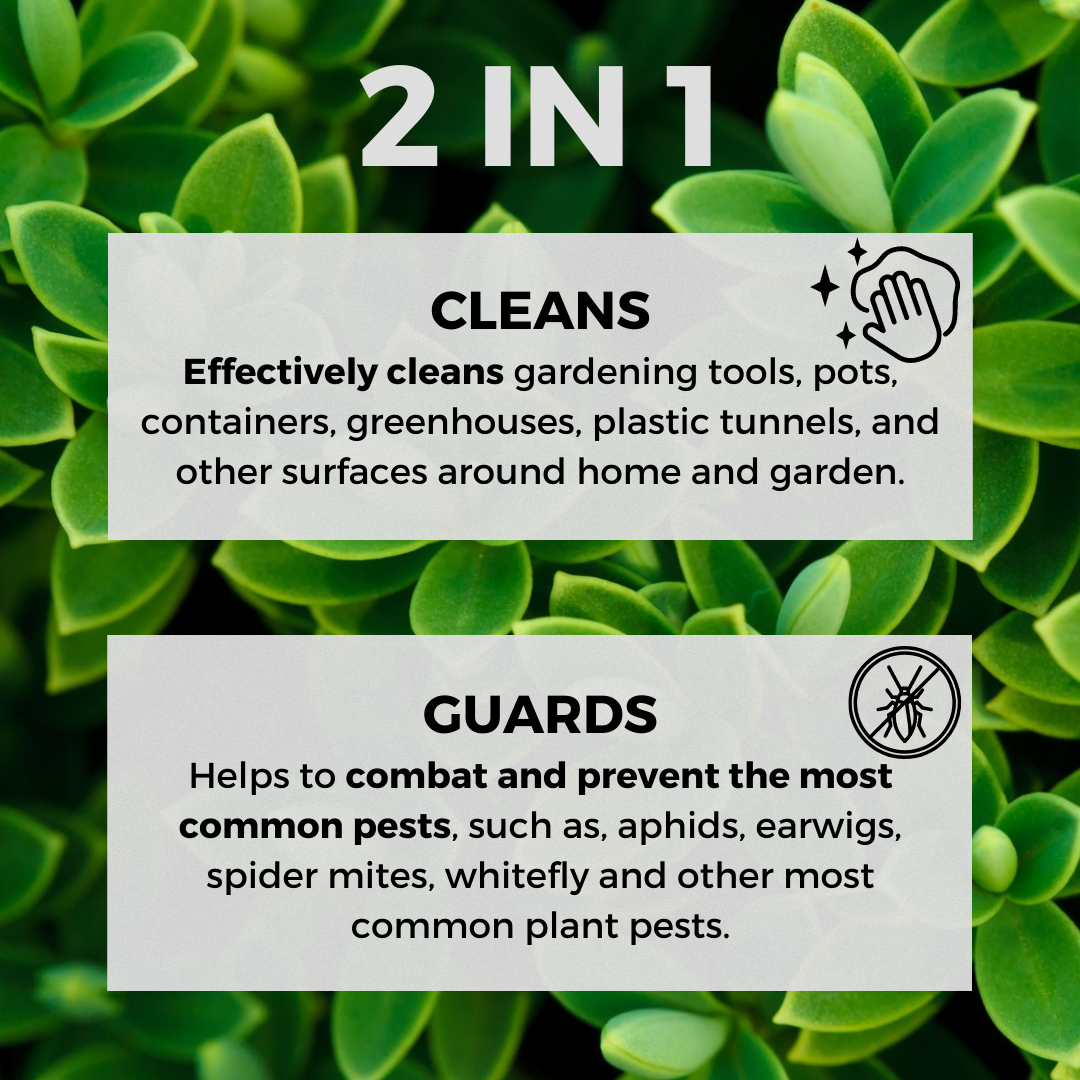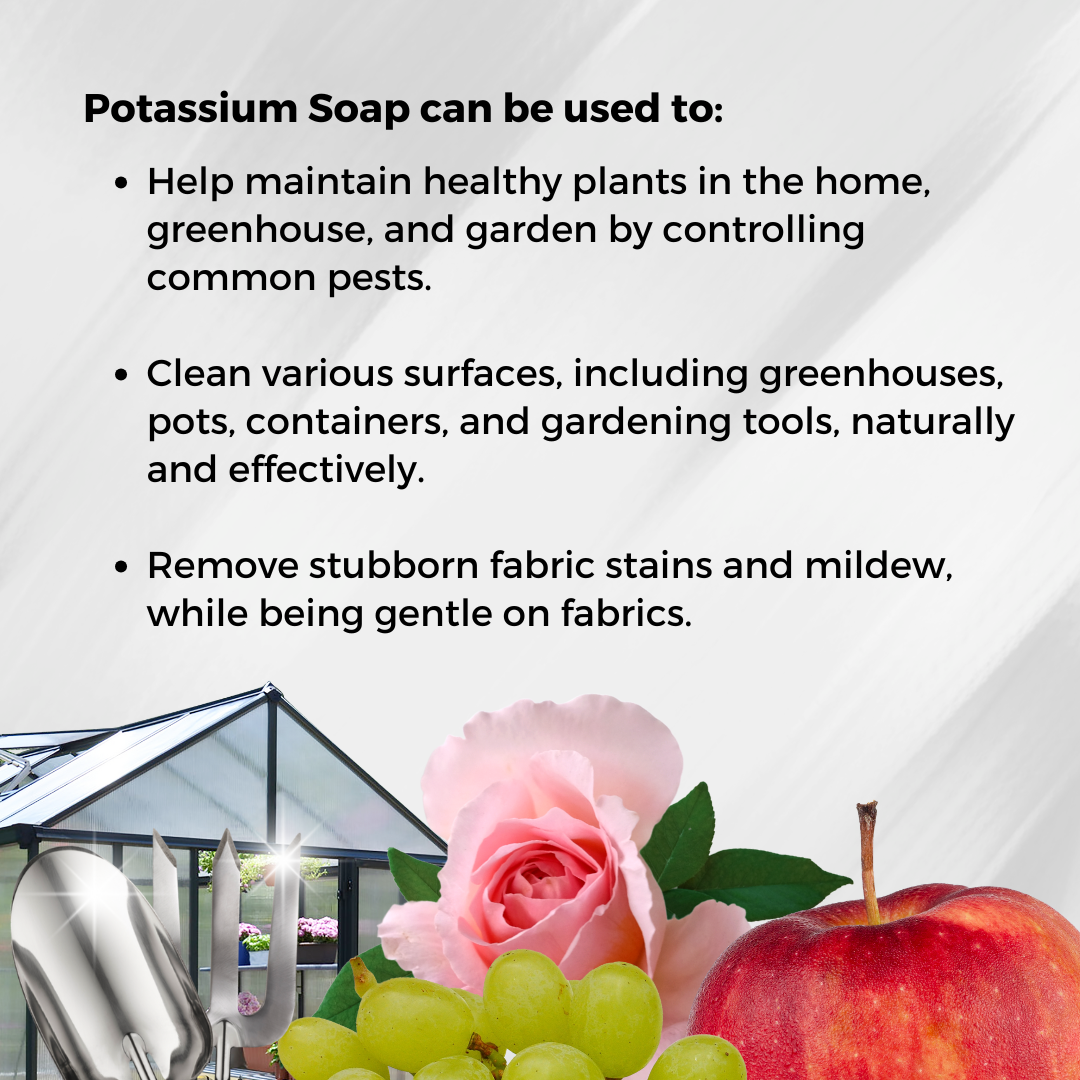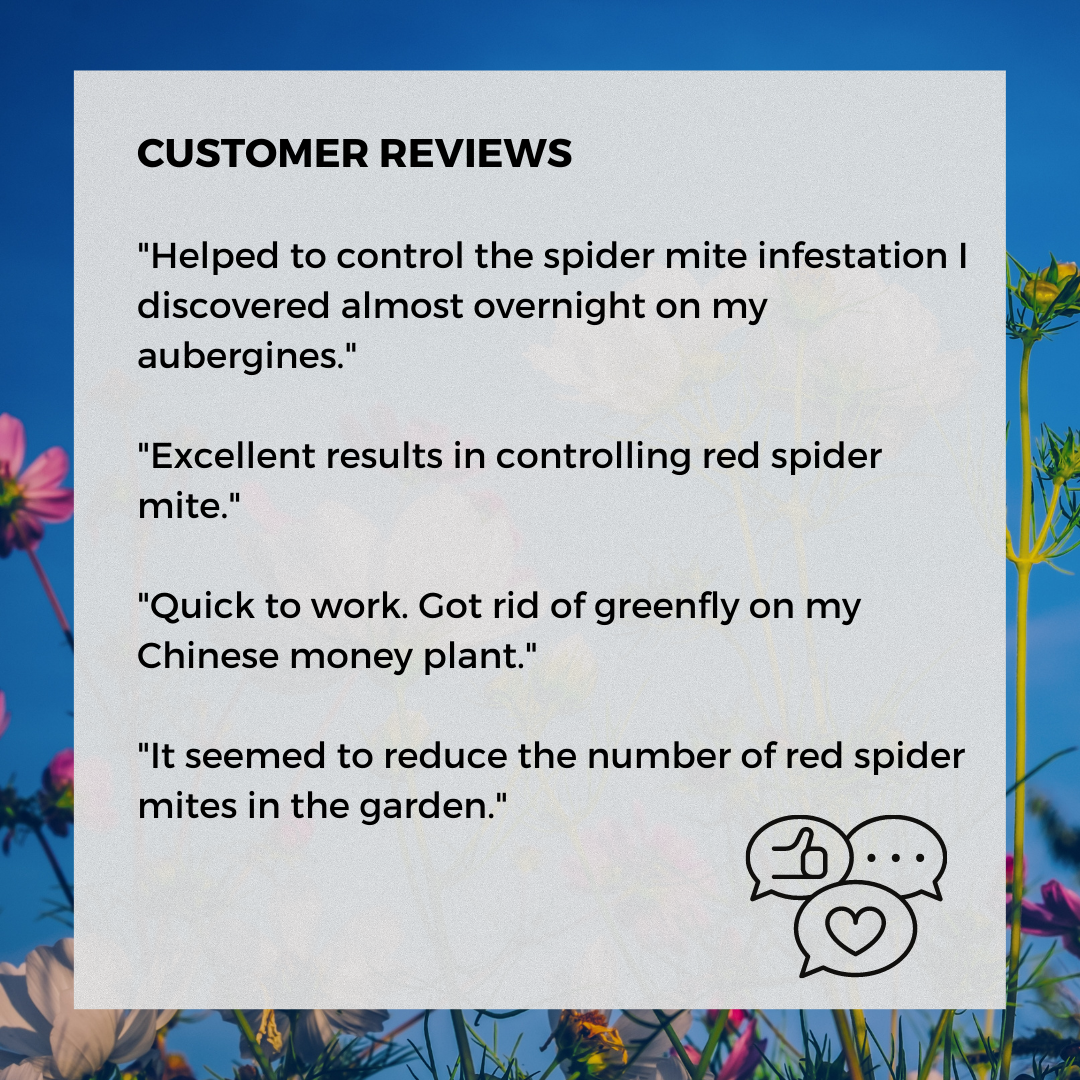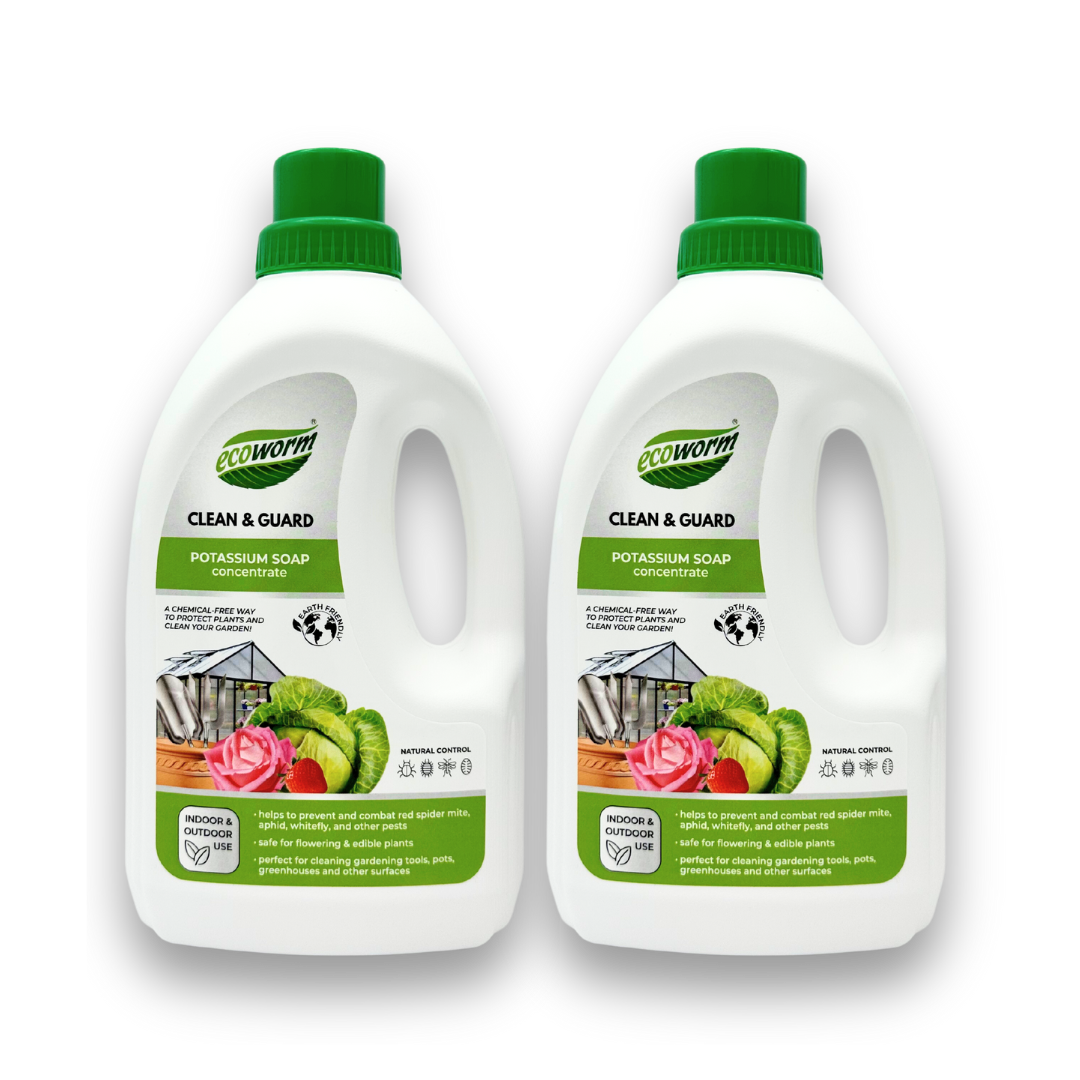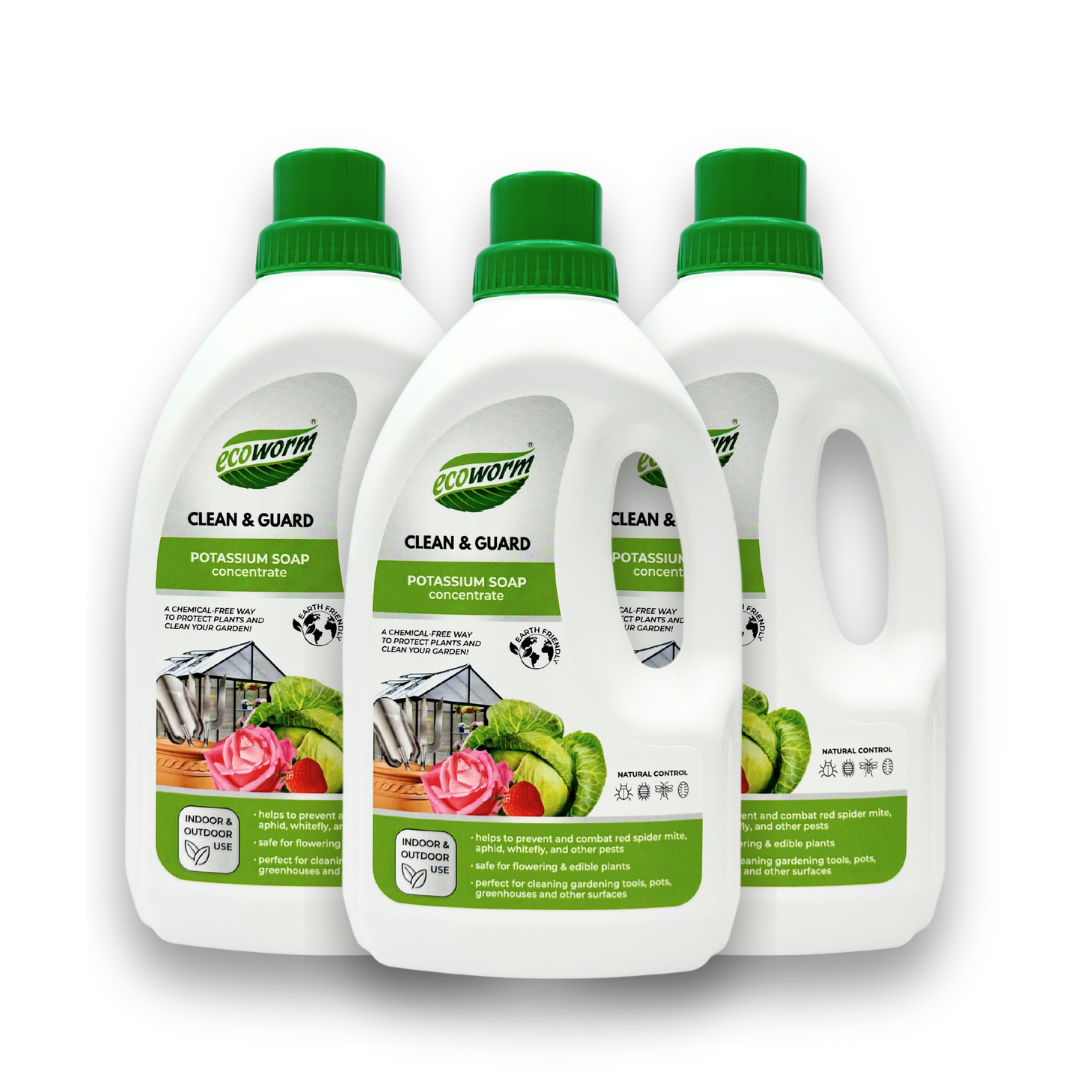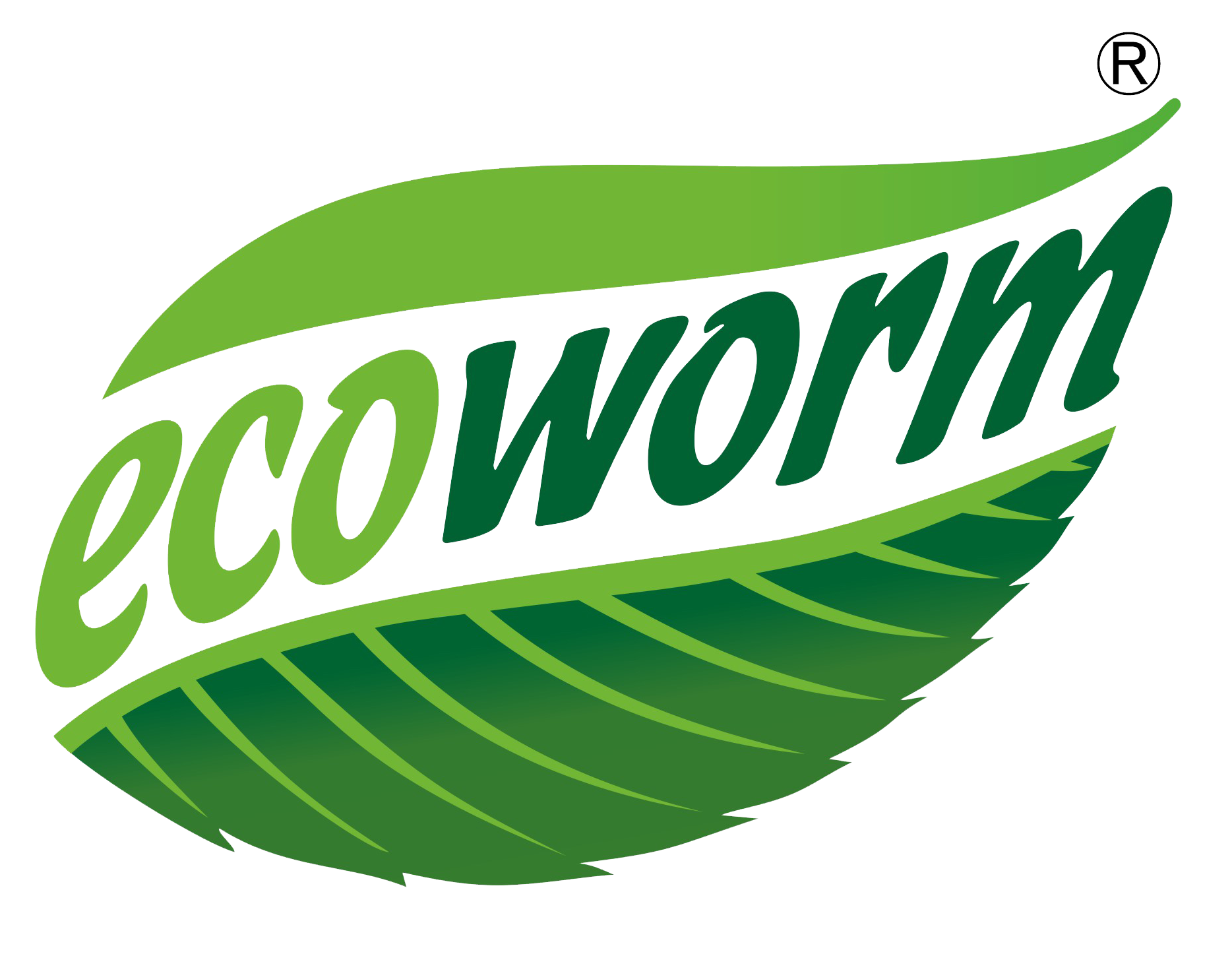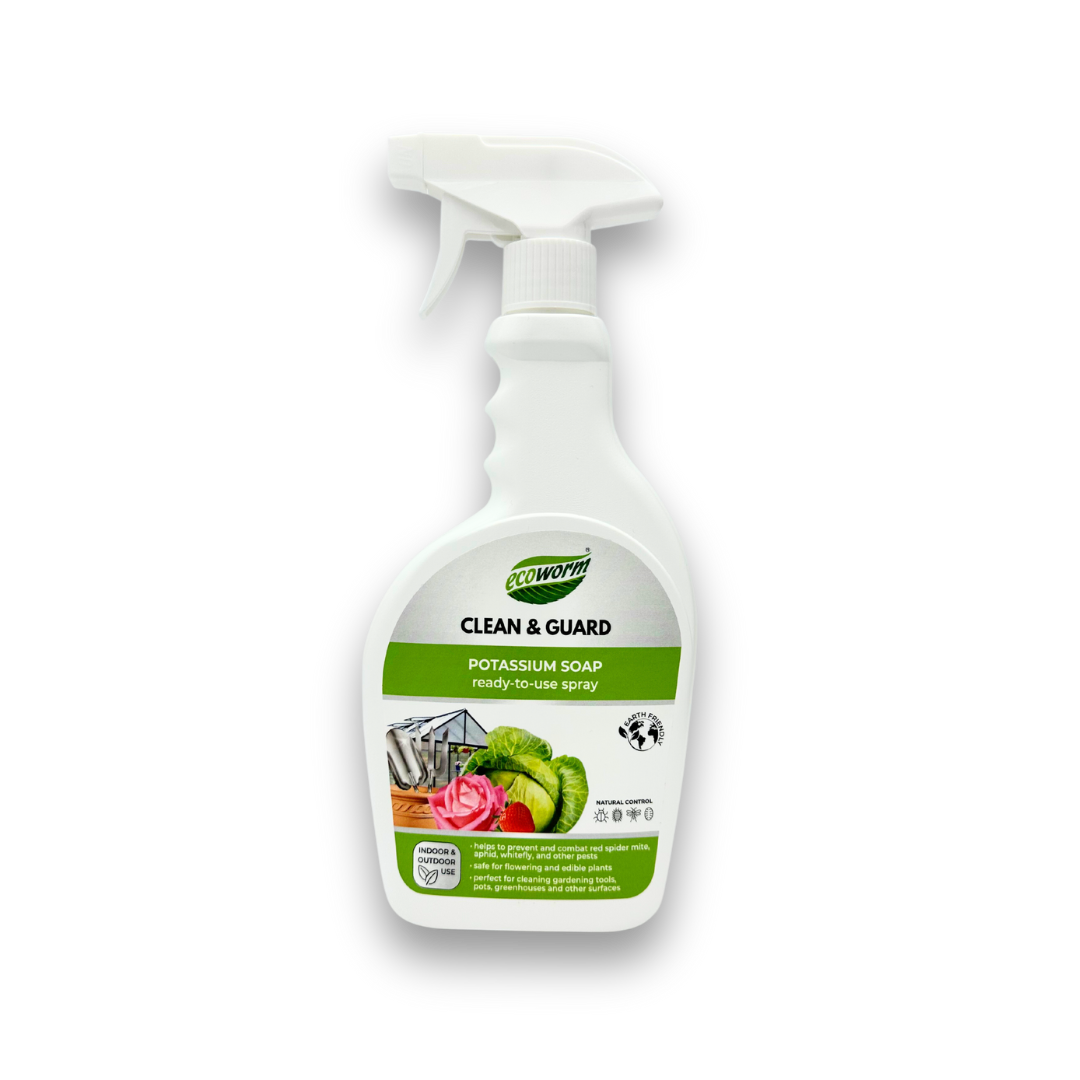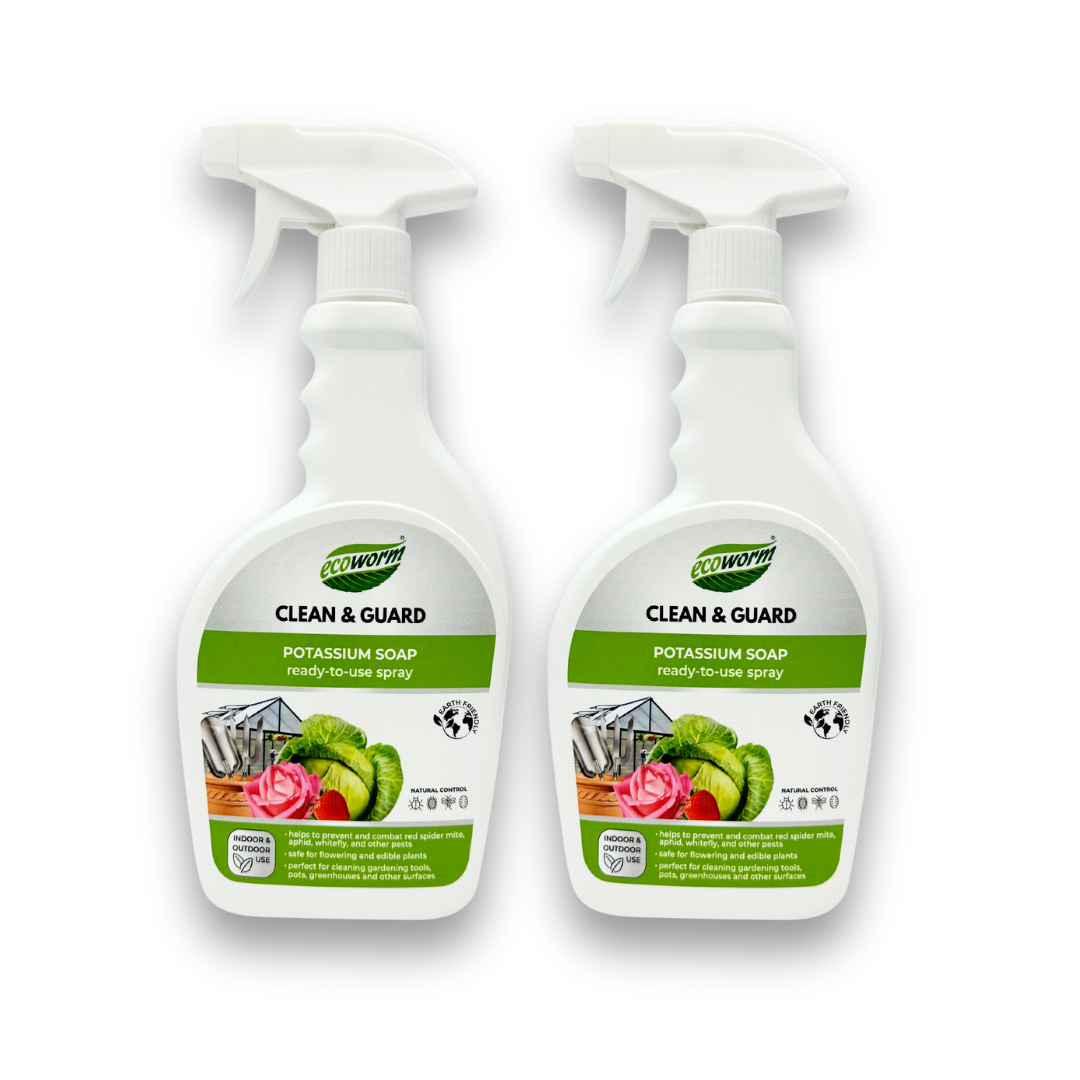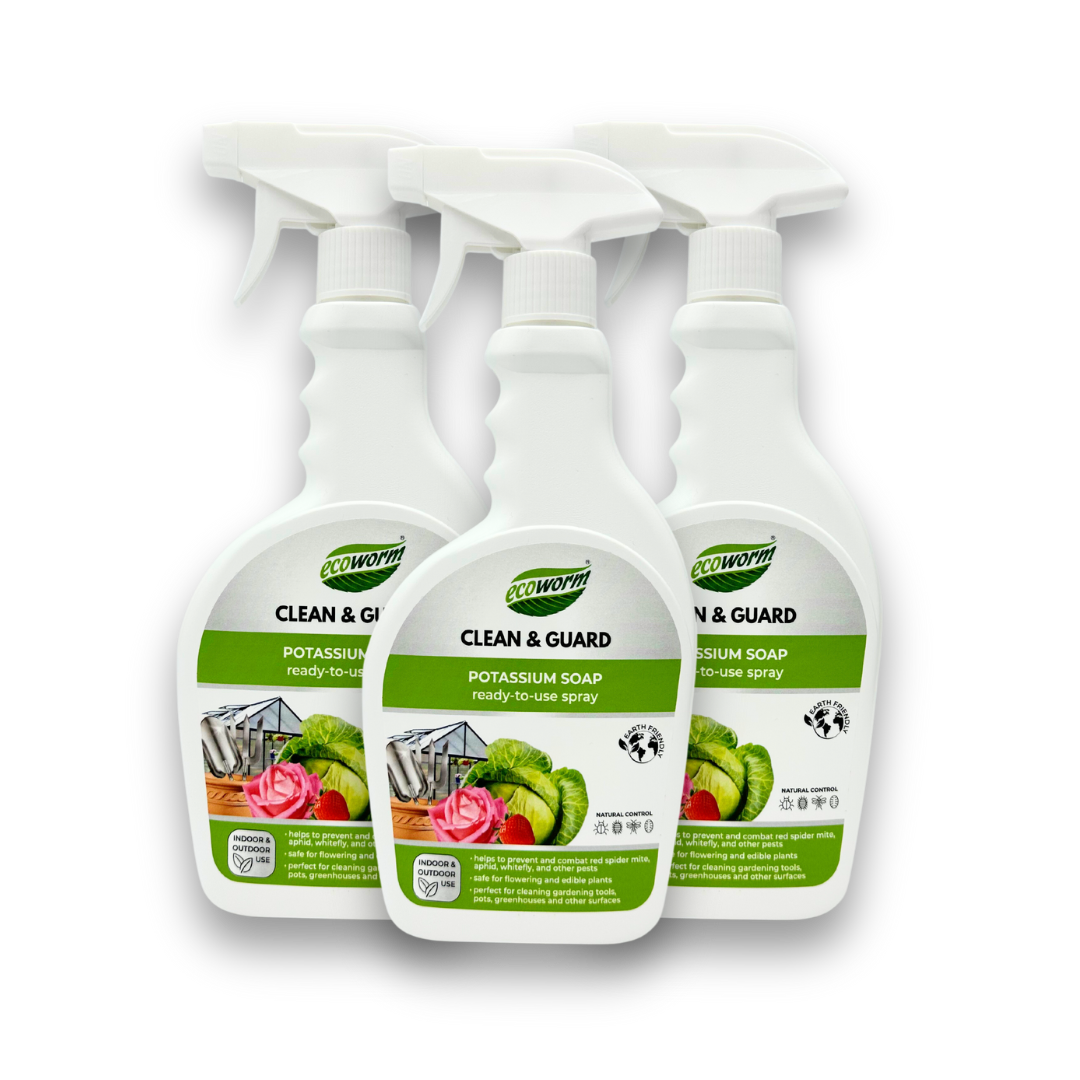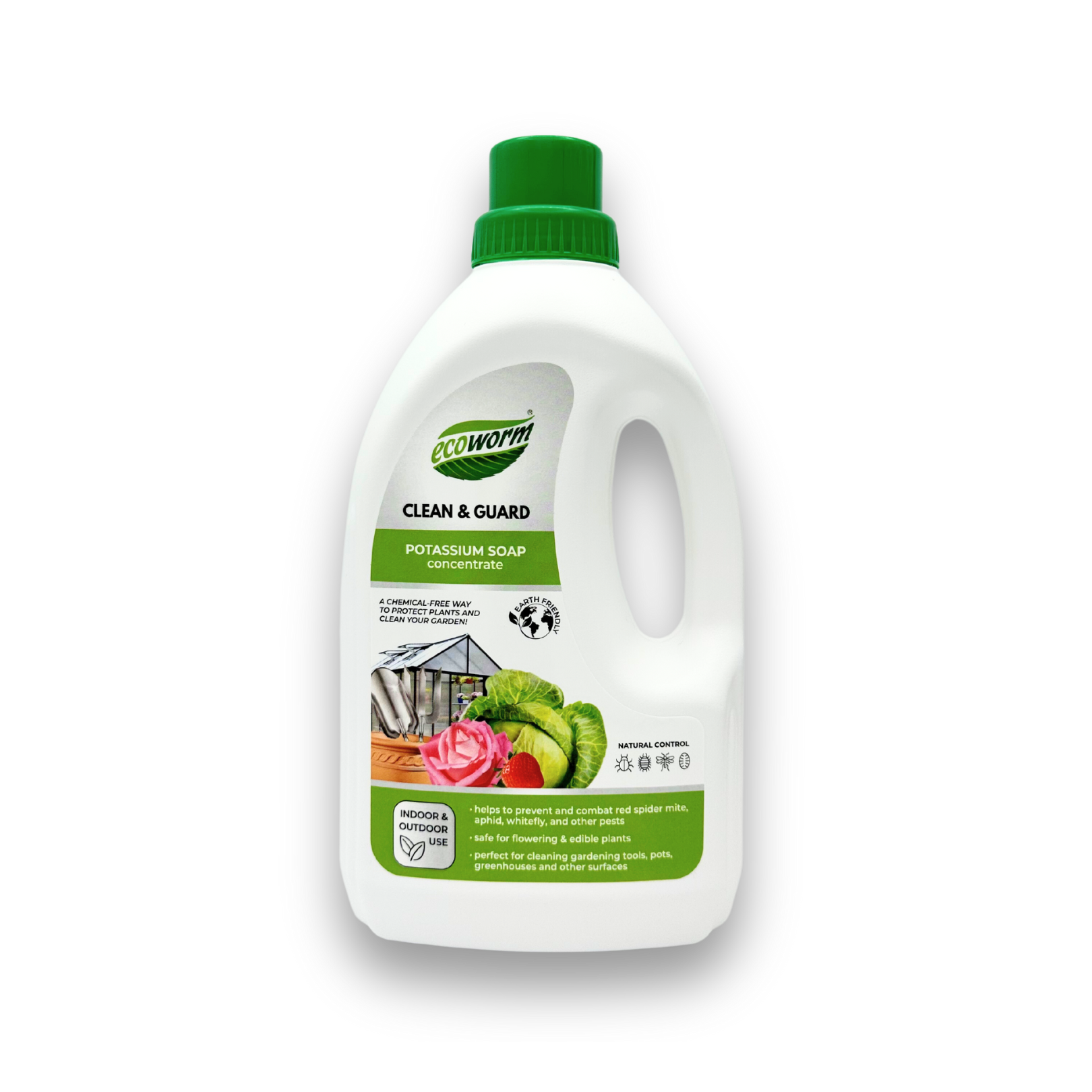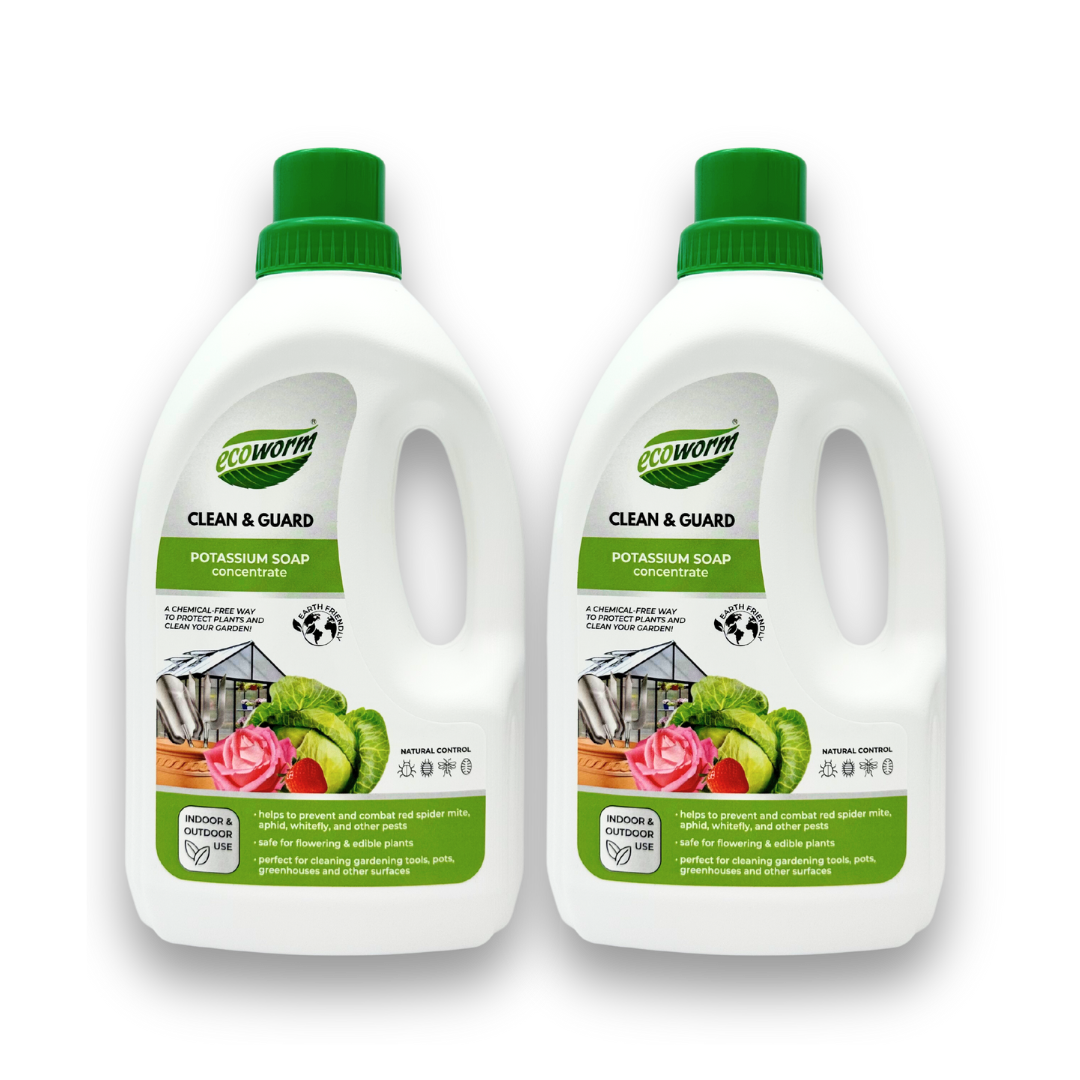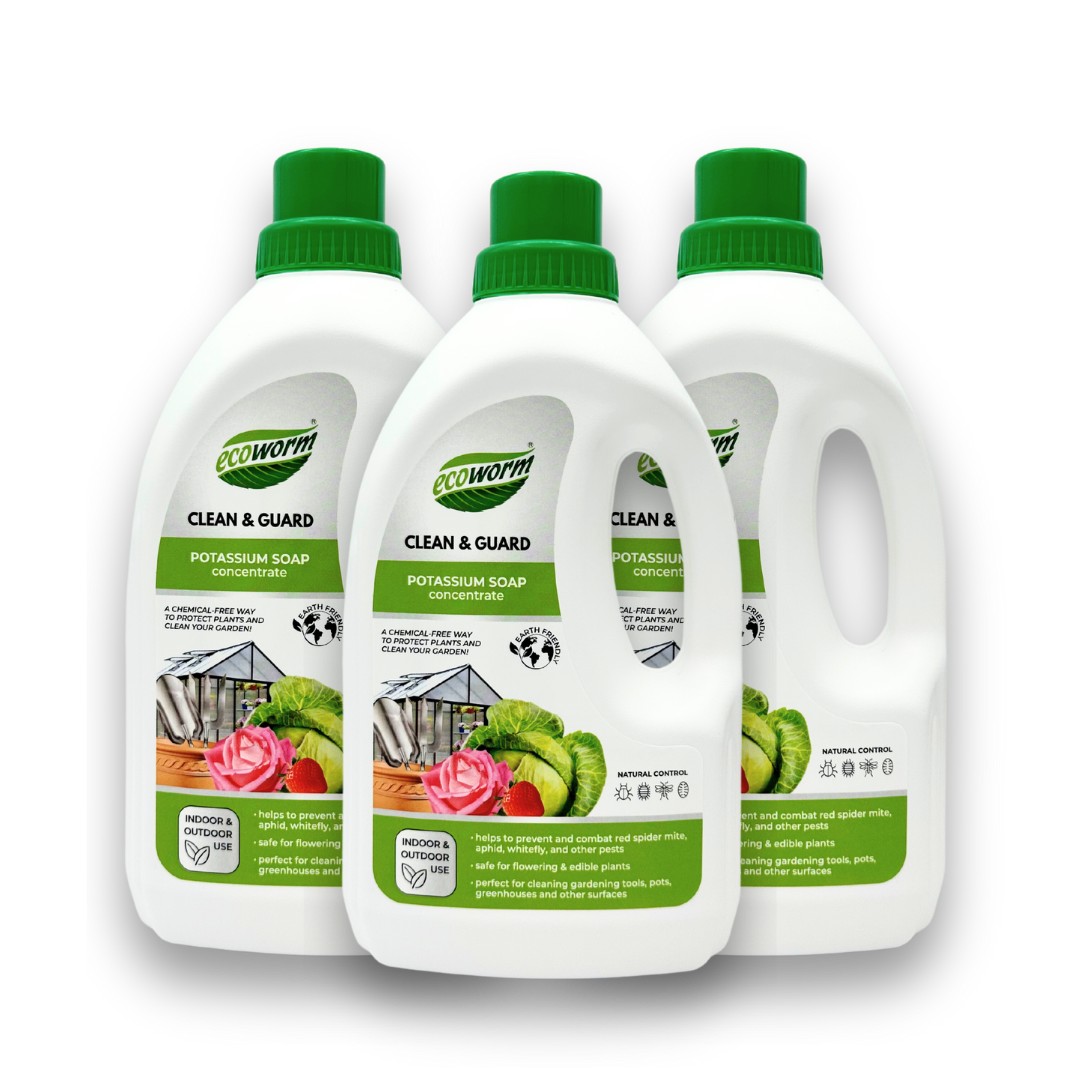Ecoworm Potassium Soap – Eco-Friendly Garden Soap for Healthy Plants
 A natural, biodegradable soap for pest-free plants and a cleaner garden.
A natural, biodegradable soap for pest-free plants and a cleaner garden.
Ecoworm Potassium Soap is a certified organic horticultural soap made from potassium salts of fatty acids derived from sunflower oil.
It’s a plant-based alternative to chemical sprays, helping to protect your plants from common pests while keeping your home and garden spotless.
What is Ecoworm Potassium Soap?
Ecoworm Potassium Soap is a biodegradable horticultural soap that works as a natural pest control and cleaner.
When sprayed on plants, it helps to remove soft-bodied pests such as aphids, whiteflies, red spider mites, scale insects, woolly aphids, caterpillars, and sawfly larvae.
It acts by dissolving pest cell membranes, which causes dehydration — yet it remains gentle on plants, pets, and the environment.
Unlike harsh chemical insecticides, Ecoworm Potassium Soap leaves no toxic residues and is certified organic by OF&G, meaning it’s approved for use in organic gardening systems across the UK.
Why Gardeners Choose Ecoworm Potassium Soap
-
Certified Organic by OF&G – trusted and approved for organic use.
-
Derived from sunflower oil – natural, plant-based, and biodegradable.
-
Effective against common garden pests – tackles aphids, mites, whiteflies, and more.
-
Safe for herbs, salads, and edible plants – simply rinse before harvest.
-
Friendly to pollinators – safe when applied responsibly.
-
Multi-purpose cleaner – use on pots, tools, greenhouses, or fabrics.
-
Available in both concentrate and ready-to-use spray – choose what suits your garden.
A Versatile Garden Essential
Potassium Soap is more than a pest control product — it’s a true all-rounder for gardeners who want to keep their growing space naturally clean.
Use it to:
-
Wash away pests and residues from plant leaves.
-
Clean and disinfect tools, pots, trays, and greenhouse surfaces.
-
Remove mildew, dirt, and tough stains from garden equipment and fabrics.
Its biodegradable formula ensures that nothing harmful is left behind — not on your plants, not in your soil, and not in the water system.
How It Works
The secret lies in potassium salts of fatty acids.
When sprayed on affected foliage, the soap breaks down the protective coating of pests such as aphids and mites, dehydrating them naturally.
Because it contains no synthetic toxins, it only works by contact and breaks down rapidly once dry, keeping your plants and soil safe.
This makes Ecoworm Potassium Soap the perfect choice for chemical-free pest control in gardens, greenhouses, and even indoor plants.
How to Apply
For Plant Spraying
-
Preventive use: every 10–14 days, especially in spring and summer.
-
When pests are visible: spray 3–4 times, one day apart, until pest activity decreases.
-
Maintenance: reapply every 8–10 days or as needed.
Spray from a distance of about 30 cm, covering both sides of leaves and stems.
Avoid spraying during hot midday hours or strong sunlight. Apply early in the morning or evening.
Safe for vegetables, herbs, and fruiting plants — simply avoid spraying directly on produce and rinse before harvest.
For Surface Cleaning
Dilute and apply the solution to greenhouse glass, benches, tools, or containers.
Leave for 1–3 minutes, then wipe or brush clean and rinse with water.
Removes mildew, sap, and dirt without harsh chemicals.
For Household and Fabric Cleaning
Ecoworm Potassium Soap can also remove stubborn stains from fabrics and surfaces.
Mix with warm water and use as a natural cleaner for garden textiles, gloves, or washable materials.
How It’s Made
Ecoworm Potassium Soap is produced from sunflower oil through natural saponification — the same age-old process used to make pure soaps.
This creates a clean, biodegradable solution containing potassium salts of fatty acids, which effectively remove pests and dirt while being safe for plants, wildlife, and soil life.
Every batch is manufactured under strict quality control and approved by Organic Farmers & Growers (OF&G) for organic use.
Environmental Responsibility
Choosing Ecoworm Potassium Soap helps reduce chemical pollution in gardens and waterways.
It’s safe for earthworms, beneficial insects, and soil microbes, all vital to healthy ecosystems.
The biodegradable formula breaks down quickly after use, leaving nature exactly as it should be — thriving.
Storage
Store in a cool, dry place away from direct sunlight and extreme temperatures (5–30 °C).
Keep containers tightly sealed.
Do not mix with other products, and use diluted solutions immediately.
Available Formats
-
Ready-to-Use Spray (RTU): convenient for smaller gardens and quick treatments.
-
Concentrate: economical and ideal for regular use in larger gardens or greenhouses.
Both are certified organic by OF&G, biodegradable, and deliver the same proven effectiveness.
Collapsible content
FAQ
Is Ecoworm Potassium Soap safe for edible crops?
Yes. Ecoworm Potassium Soap is certified organic by OF&G, fully biodegradable, and free from synthetic pesticides or harmful residues. It’s ideal for use on vegetables, herbs, salads, and fruiting plants in both gardens and greenhouses. As with all foliar products, allow a few days between your final application and harvest, and always rinse produce before consumption.
Why is there a 5-day withdrawal period before harvesting?
The short 5-day withdrawal period is simply a best-practice guideline in organic horticulture. It allows time for any natural soap residues on edible surfaces to break down completely, ensuring your harvest looks and tastes its best. It’s not due to toxicity — Ecoworm Potassium Soap is fully biodegradable and safe for food crops. This recommendation aligns with OF&G organic standards and demonstrates responsible organic practice.
Can it be used on all plants?
Yes — Ecoworm Potassium Soap is safe for most flowering and edible plants. However, some sensitive species may react under extreme heat (above 32°C) or if the plant is dehydrated. Always apply when plants are well-watered. To test tolerance, spray a small amount on one leaf and wait 24–48 hours. If no browning or spotting appears, it’s safe to treat the rest of the plant.
Why do you recommend not spraying directly on fruits or vegetables?
Potassium Soap is designed to clean and protect leaves and stems, where pests such as aphids and mites live. Spraying directly on fruits or vegetables doesn’t improve effectiveness and may leave a light residue on delicate produce. For best results, focus on leaves and stems, avoid direct contact with edible parts, and rinse crops before harvesting or eating.
Can it be used on tomatoes, strawberries, or peppers?
Yes — it’s safe for plants that bear fruit, including tomatoes, strawberries, and peppers. Apply to the leaves and stems only, not directly on the fruit. This prevents visible residue while keeping your plants pest-free and healthy.
Can I use Ecoworm Potassium Soap on herbs and salad plants?
Yes — Ecoworm Potassium Soap is suitable for use on all edible foliage, including herbs and salad crops such as lettuce, rocket, spinach, basil, and parsley. It contains only plant-based ingredients derived from sunflower oil. When used as directed, it effectively removes pests and residues from leaves. Always rinse herbs and salads thoroughly before eating.
How is it made?
Ecoworm Potassium Soap is made from potassium salts of fatty acids derived from sunflower oil. This natural saponification process creates a pure horticultural soap that’s completely free from synthetic chemicals, making it ideal for:
- Organic pest management
- Cleaning gardening tools, pots, and surfaces
- Removing stubborn stains from fabrics and equipment
Does it harm beneficial insects like ladybirds or bees?
No. When applied correctly, Ecoworm Potassium Soap is generally safe for beneficial insects such as ladybirds and pollinators. It only targets soft-bodied pests (like aphids and mites). To minimise any risk:
- Spray in early morning or late evening, when pollinators are less active.
- Avoid direct contact with beneficial insects.
- Focus application directly on pest areas.
Can it be used indoors on houseplants?
Yes — Ecoworm Potassium Soap is safe and effective for indoor pest control on houseplants. It helps manage common indoor pests such as aphids, spider mites, and whiteflies. When using indoors:
- Ensure good ventilation during and after spraying.
- Avoid spraying directly on edible plants unless they’ll be washed before eating.
- Follow the dilution guide carefully and avoid overuse in enclosed spaces.
How often should it be applied?
Preventive use: every 10–14 days during the growing season.
Active infestations: spray 3–4 times, one day apart, until pest activity decreases.
Maintenance: reapply every 8–10 days or as needed.
Always follow dilution instructions and adjust frequency according to pest pressure and plant sensitivity.
Does it harm soil or roots?
No — Ecoworm Potassium Soap is fully biodegradable and safe for soil life. It acts only on pests present on plant surfaces and breaks down quickly without affecting roots or beneficial microorganisms.
Can it be used during flowering?
Avoid spraying directly on flowers or buds during bloom, as it may cause minor petal spo
Ecoworm
Ecoworm Potassium Soap - Natural Horticultural Soap & Bug Spray – Ready-to-Use 0.5L
Share
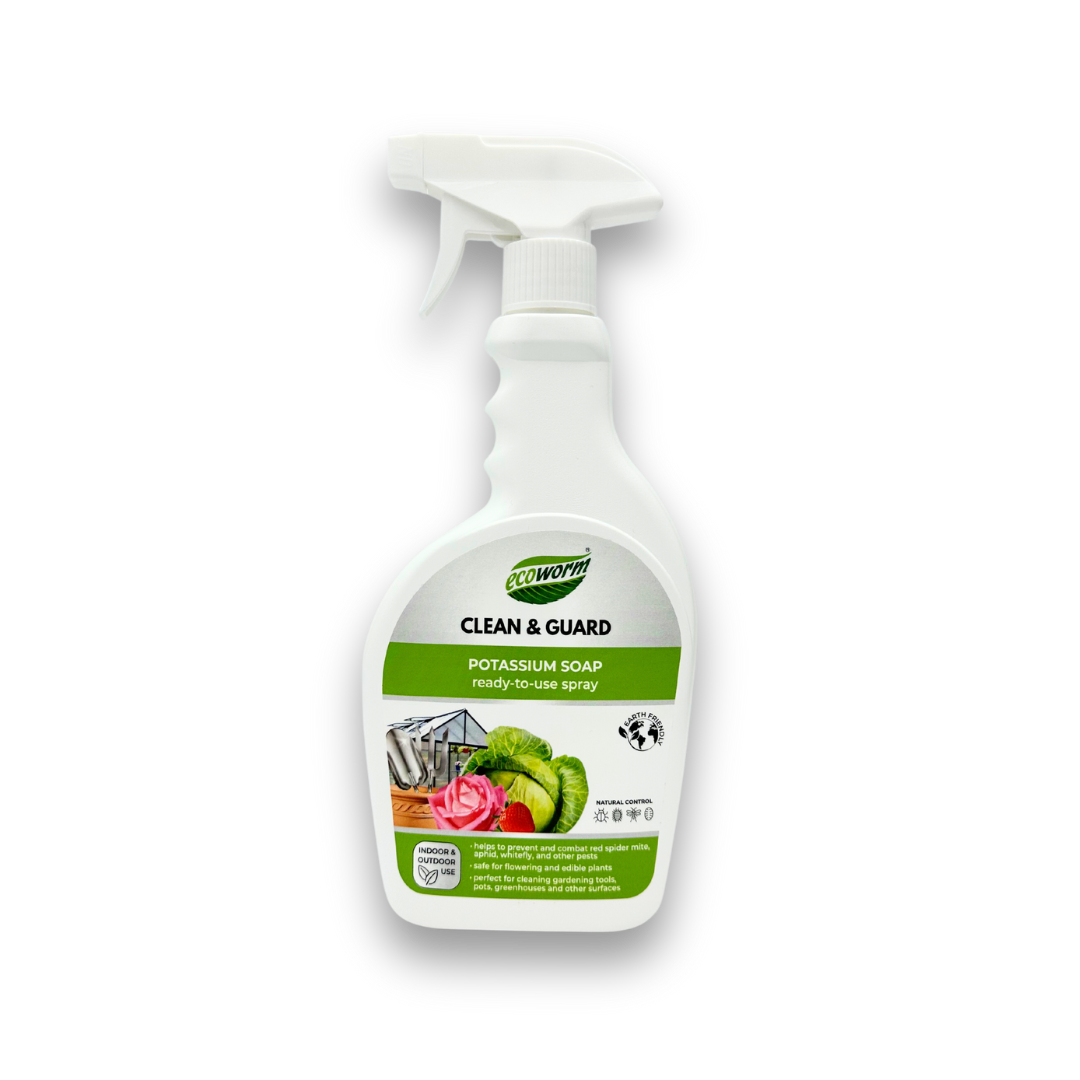
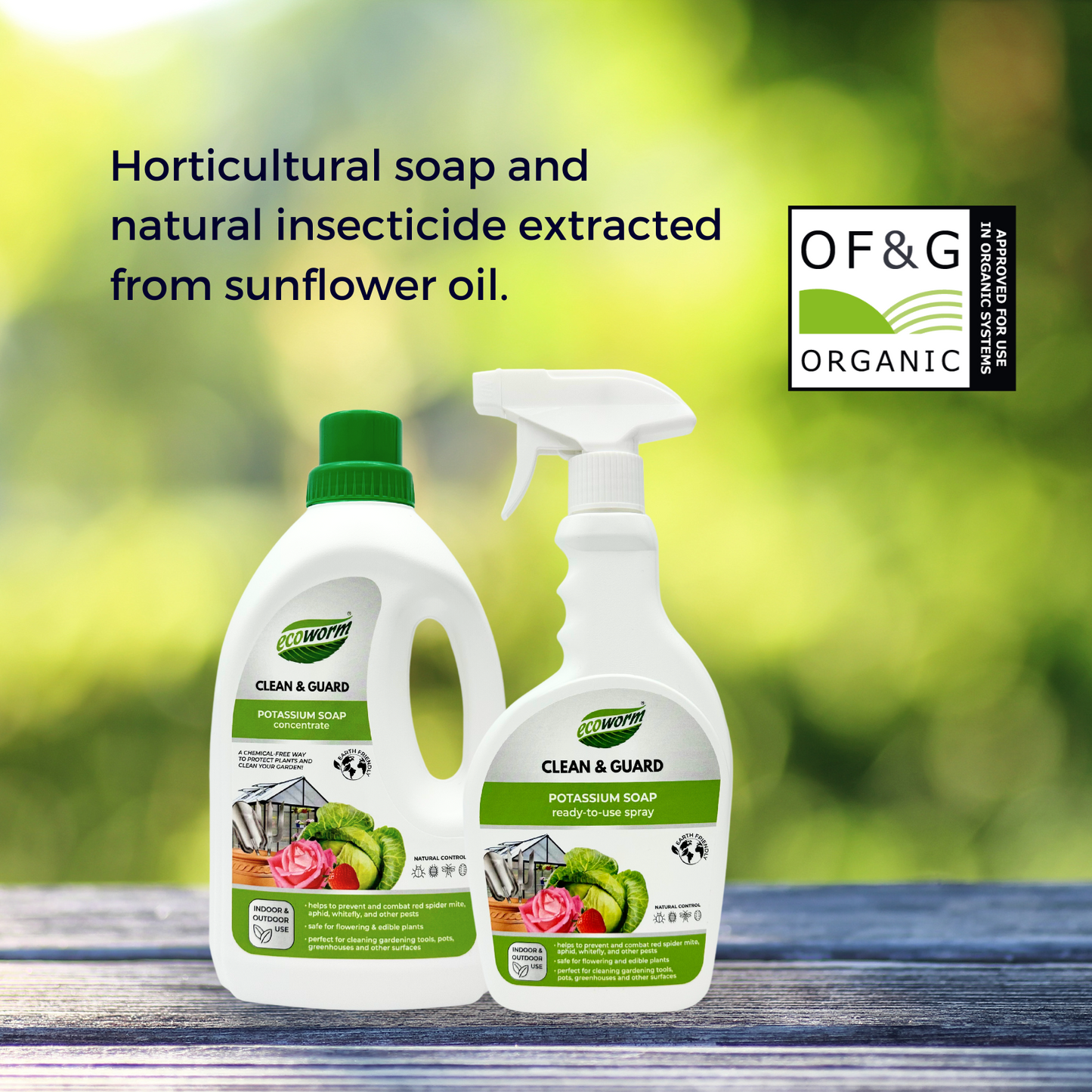
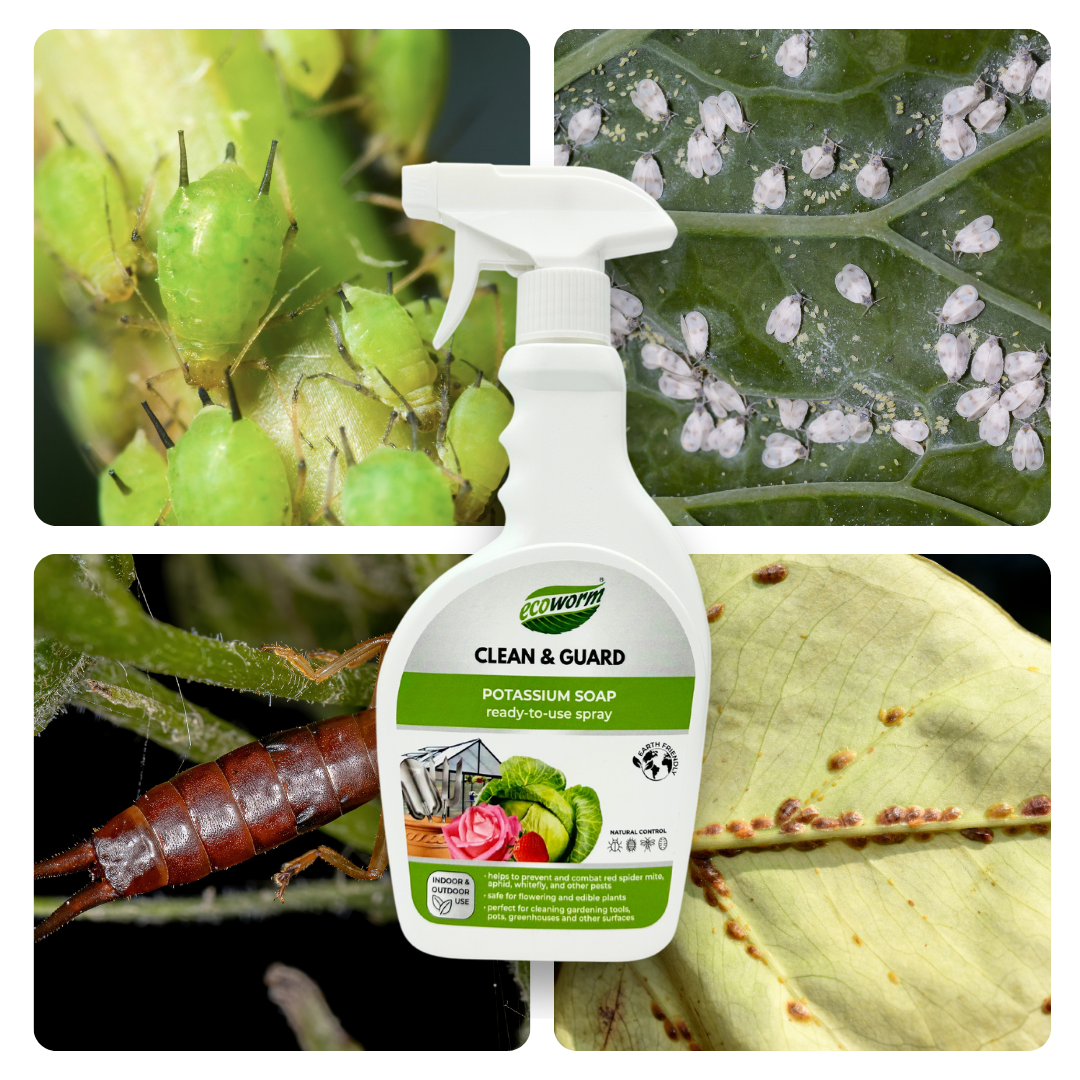
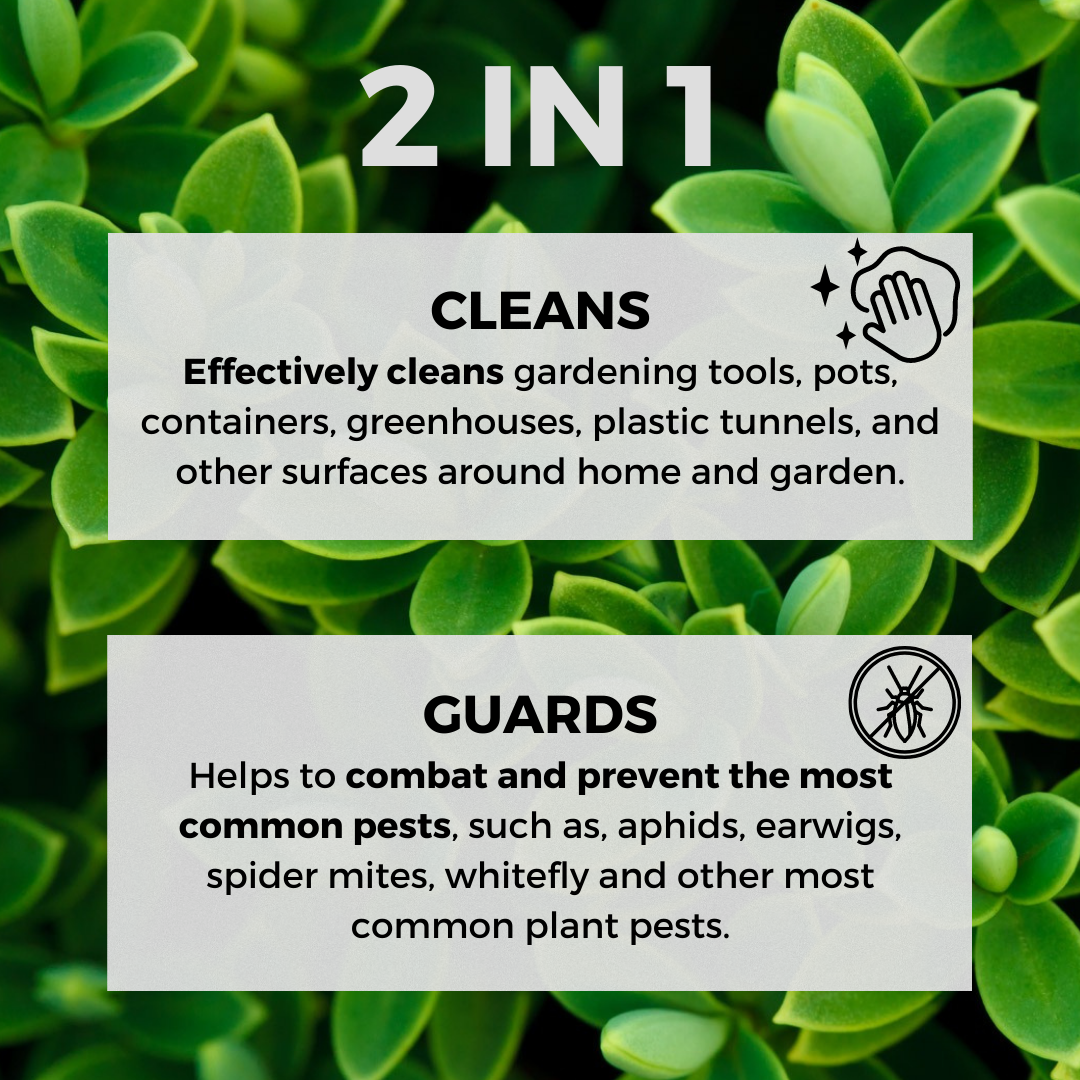
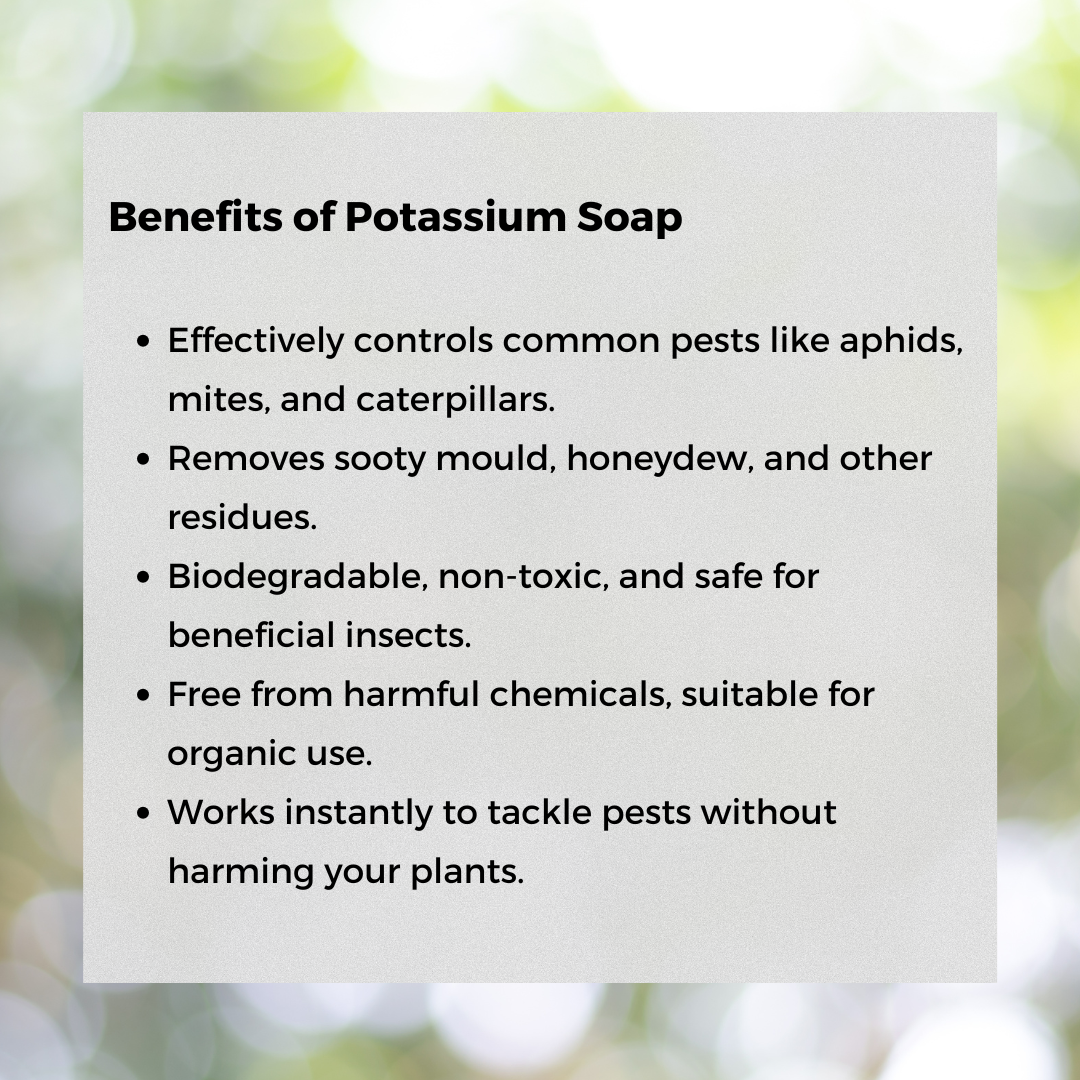
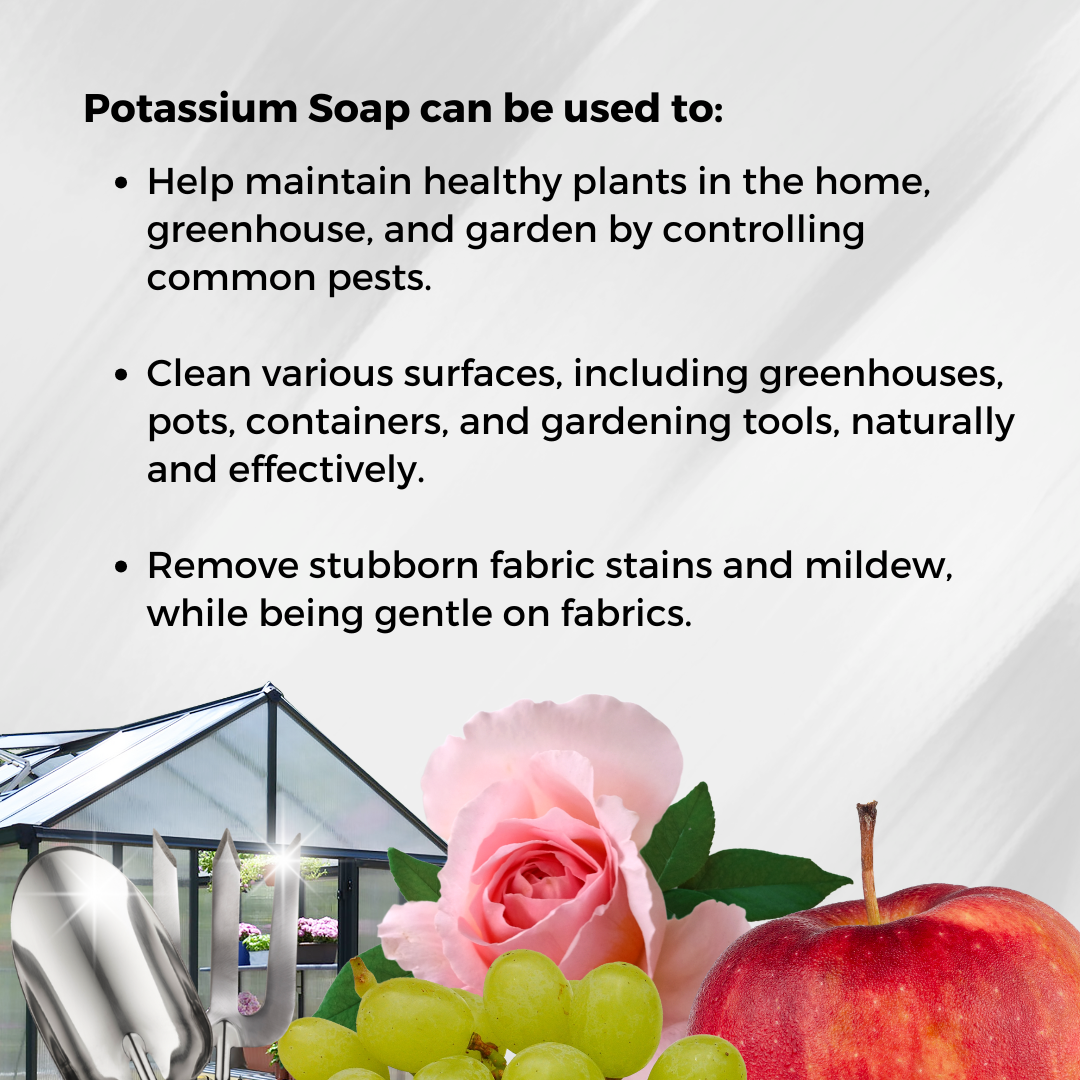
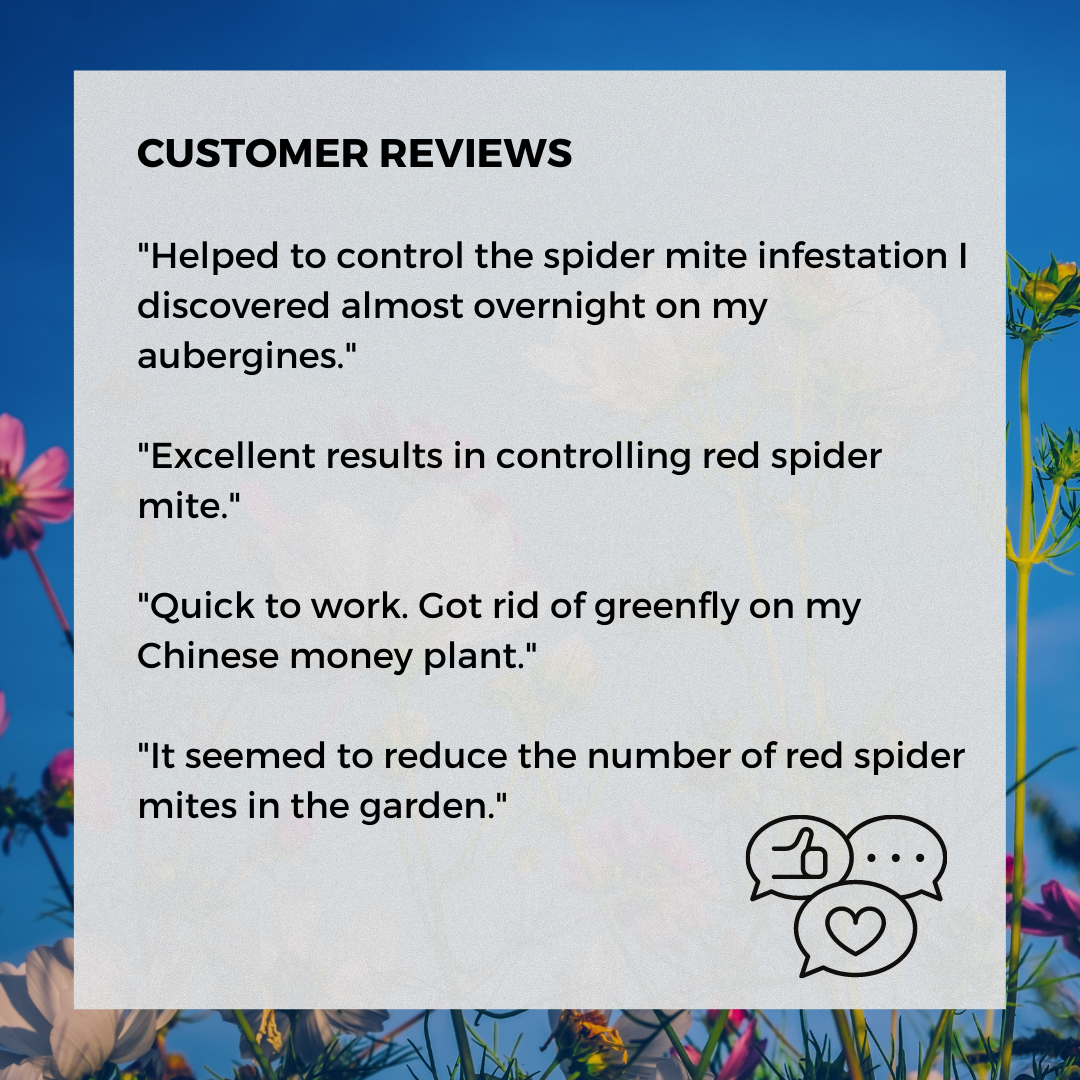
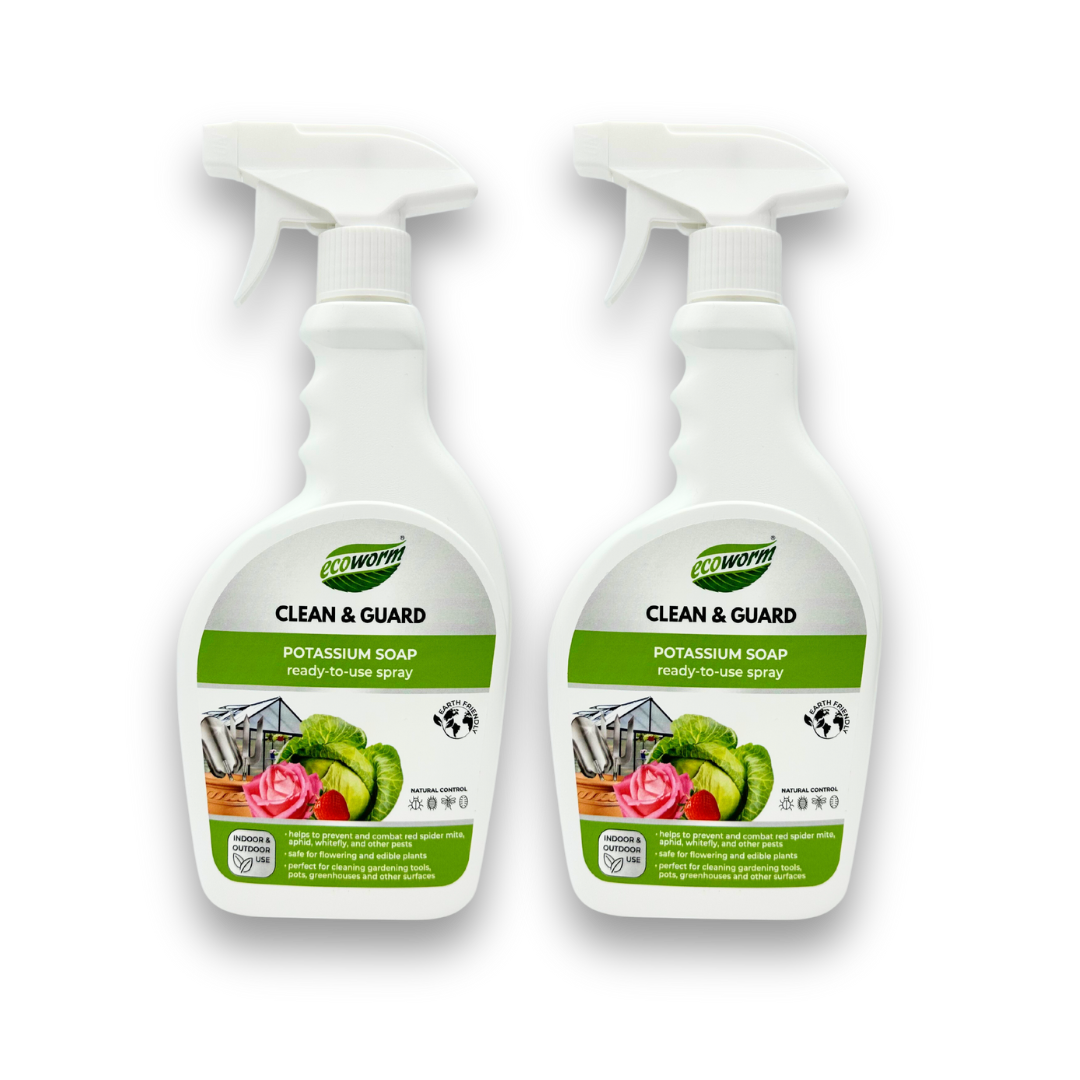
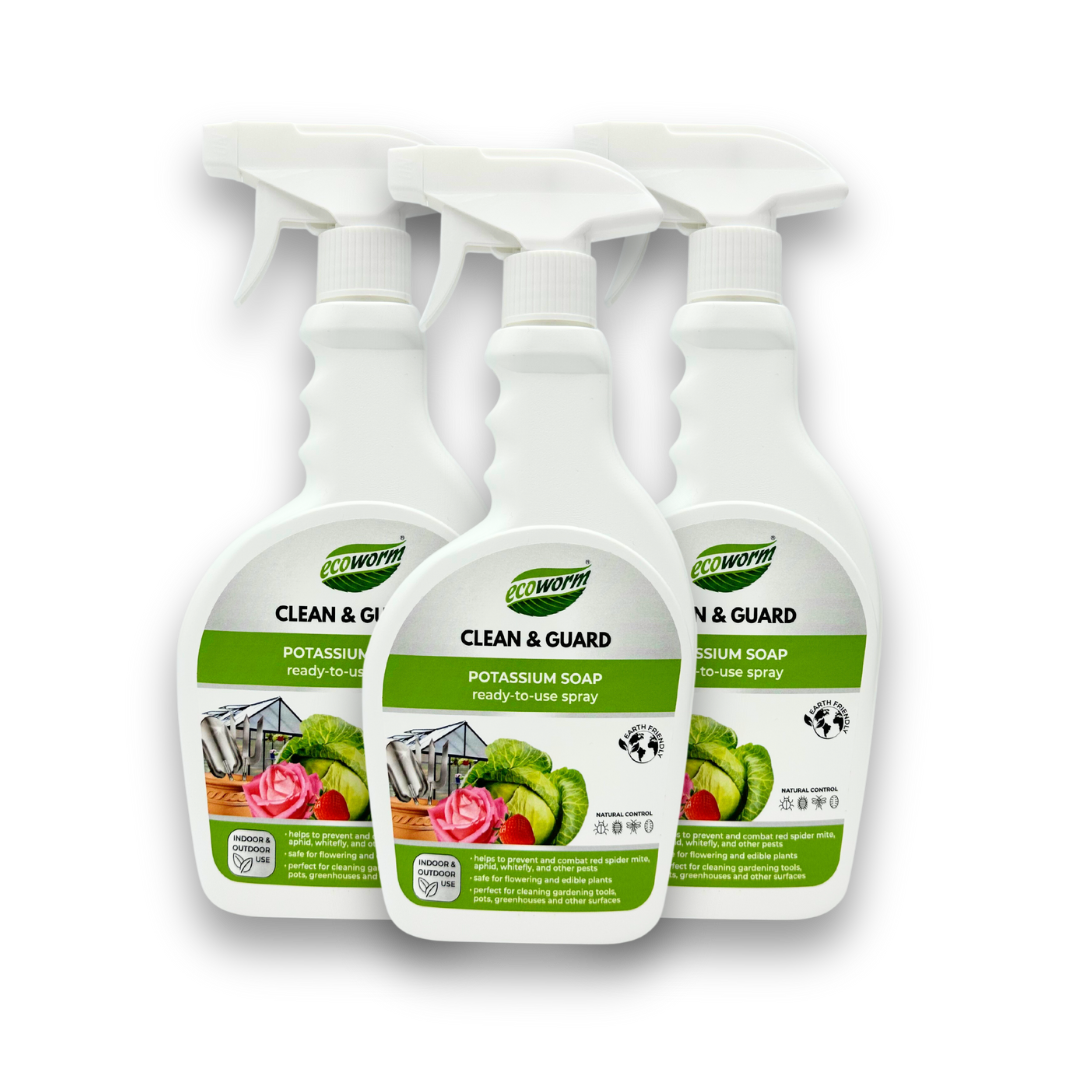
Ecoworm
Ecoworm Potassium Soap Concentrate - Organic Horticultural Soap & Natural Bug Spray for Plants 1 L
Share
